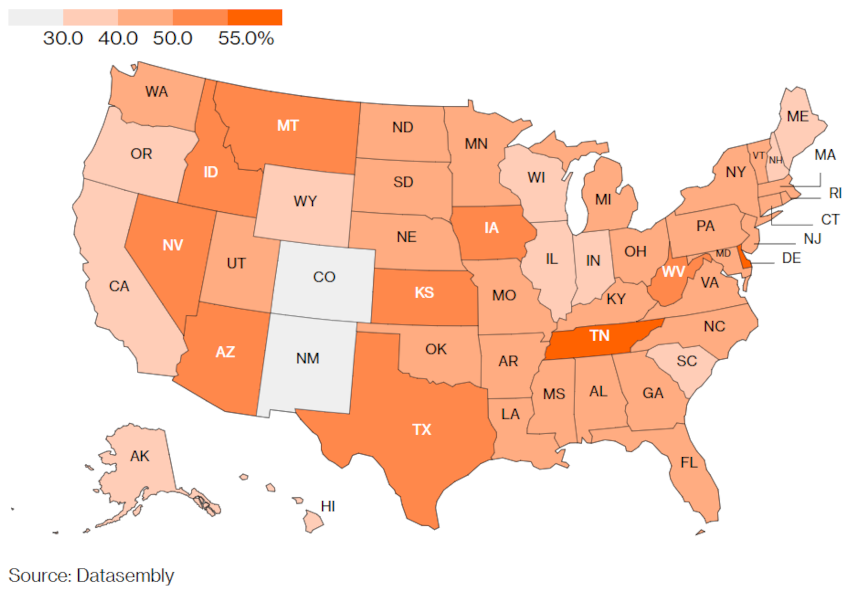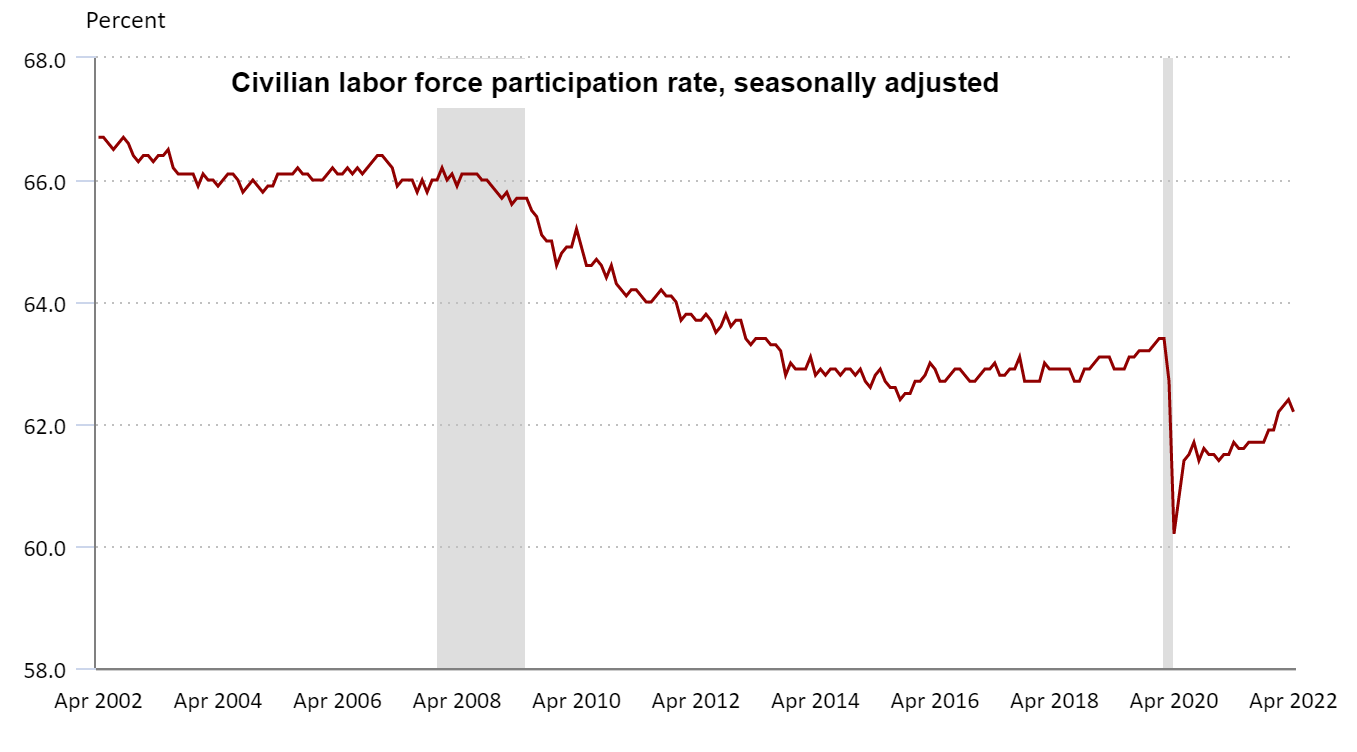Baby Formula Blues
It’s hard to believe that the United States, once not only able to feed itself (and perhaps overfeed itself) but also a large fraction of the world in addition, is now facing a shortage of baby formula. This shortage does not necessarily mean that the ‘land of the free and the home of the brave’ is in decline but is more an indictment of the kind of short-sighted thinking so common in economically illiterate folk. But first let’s begin with the facts.
According to the Washington Examiner article entitled Here's what's causing the baby formula shortage, the countrywide shortage, which started in late winter of 2021, regionally ranges from 30% to 50% at mid-May (likely has increased since then).
(Map source: Infant Formula Shortage in US: Where Is Baby Food Hardest to Find?, Bloomberg)
The article provides a quantitative example of how changes in demand (or quantity demanded) has pushed the cost up by noting that a 12.4-ounce can Enfamil Gentlease, formula design for fussy or crying babies, is listed (at the time of the writing) on eBay for $55 ($45 + $10 shipping) compared to the normal grocery-store price of $19.
Several articles identify the groups hardest hit by the shortage. The Washington Examiner piece notes that the shortage is “especially acute for parents of babies who require specialty formulas to address allergies, as well as gastrointestinal or metabolic conditions”, while the Everything You Need to Know About the Baby Formula Shortage, by Yahoo, states that “not surprisingly, the most affected parents are those on the lowest income…poorer women, infants and children, [who are on] WIC, which provides formula for a majority of [the] babies in low-income families.” As a result of how the most vulnerable are being effected, most large retailers are rationing the supply to prevent hoarding. For example, Target has been limiting purchases to 4 cans while the Walgreens and CVS limits are 3.
Okay, so the shortage is real and painful. But then why is it happening.
The Washington Examiner article lists four reasons for the shortage:
- weak production market unprepared for pandemic hoarding
- decline in breastfeeding
- recent supply chain problems
- Abbott labs formula recall
Let’s look at what the experts have to say on each of these fronts and judge and critique.
Weak Production Market Unprepared for Pandemic Hoarding: unlikely
The pandemic ‘officially’ began in mid-spring of 2020 with the ‘flatten the curve’ edicts coming out in April of that year. Disposable goods, like toilet paper, were certainly in short supply initially and some segments of the public reacted by buying (i.e., hoarding) immense amounts. But by the fall of the 2020, manufacturers began to respond – after all their job is to make and sell products in order to make a profit – and the amounts of all goods returned to near-pre-pandemic levels. The Washington Examiner article even cites (in the discussion of another possible reason) “The supply of formula was relatively stable in the first half of 2021, but by July, the availability of formula on shelves began to dip, according to Datasembly.” So while it is certainly the case that there is some hoarding happening now, it is unlikely that it is anything other than a public reaction to the recent-developing shortage that can be blamed on the pandemic.
Decline in Breastfeeding: unlikely
There are two facts (noted above) that speak against this possibility. First, the change in a family attitude to a pregnancy or a recent birth is not something that ‘changes on a dime’. A time scale of years not months is what is needed to see large swings in demographic trends like the percentage of mothers who want to breastfeed. Second, as discussed above, the supply of baby formula was described as “relatively stable” in the first half of 2021. The only way that a decline in breastfeeding could have happened so quickly would have been a scenario like the following: suppose the CDC had said that breast milk was now poisonous due to COVID and breastfeeding was ‘contraindicated’. Under this, admittedly ridiculous claim, one could see large segments of breastfeeding mothers abandoning their regimen and starting a run on the stores. But there a scenario like this would have been public knowledge and mentioned in the article.
Recent Supply Chain Problems: possibly but small impact
Until recently, the term ‘supply chain’ was known only to a few insiders who cared about manufacturing and production. It is now a buzz phrase akin to the ‘devil made me do it’. Nonetheless, there are some plausible and implausible reasons being laid at the feet of supply-chain woes. In the Washington Examiner article they do list a plausible scenario involving worker unavailability. Here we find the first of the four governmental failing that help explain the shortage. The government has incentivized workers leaving the workforce due to COVID by subsidizing people staying home. The workforce participation rate (graph from BLS) has yet to reach pre-pandemic levels
The article also seeks to blame the war in Ukraine for having a role in hampering imports but this is a unlikely effect as the regulations for importing baby formula are quite restrictive (more on this in a bit). So, overall, supply chain issues are likely having a small effect on the delivery of more baby formula.
Abbott labs formula recall: root cause
Here we finally get to the root cause of the formula shortage and we will find ample evidence to lay three very big failings at the feet of government. The single biggest and by far the clearest cause of the baby formula shortage is the FDA’s continued shutdown of the Abbott Nutrition’s manufacturing plant in Sturgis, Michigan. The FDA stopped production in February after receiving complaints of infections due to Cronobacter sakazakii bacteria and possibly Salmonella, in four babies from September 2021 to January 2022, according to the Washington Examiner article. According to the article The baby formula shortage is getting worse, by CNN, a former employee filed a whistleblower complaint documenting his concerns for safety problems at the plant. According to the article:
…
The Abbott spokesperson also said that products tested for Cronobacter sakazakii and Salmonella all came back negative, and that no Salmonella was found at the Sturgis facility during the investigation.
The article entitled Abbott says two months for baby formula to hit shelves amid US shortage, by US News and the Guardian, added that: “In all four cases [of baby illness and death], the state, the FDA and/or CDC tested samples of the Abbott formula that was used by the child,” it said. “In all four cases, all unopened containers tested negative.”
Nonetheless, the plant remains shutdown leaving parents to scramble for ways to feed their babies.
The next governmental misstep was the lack of awareness of the repercussions of shutting off a major supply of formula and failing to be nimble in adjusting the infrastructure by relaxing the restrictions against importing baby formula from overseas. Clearly, children in other countries grow up to be healthy and relatively happy and yet these governments (often ones being offered as paragons in other settings) aren’t trusted to supply oversight in producing baby food.
The fourth governmental misstep is perhaps to most startling: telling parents of newborns not to create their own home-made formula as it is dangerous. Really? Is starvation less dangerous? Just what do the bureaucrats want parents to do? Should they hunt around from store to store in the hopes of finding the ‘golden can’ of formula, all the while wasting precious resources on what is likely a fools errand?
The Unseen Cost the Underlying Cause
The underlying cause of these four failings on the part of government is the very problem that Frédéric Bastiat decried in many of his famous discourses on the ‘unseen cost’. The agents of government can clearly feel the ire they would draw if they didn’t provide subsidies for workers sidelined by the pandemic but they can’t see that an over-indulgent application incentivizes lower work force participation. They can see the accusations that would be hurled towards them if a few ‘infected’ cans of domestically-produced or a few containers of ‘sub-standard’ foreign-produced formula end up in circulation but they feel no heat in turning off the supply. They rest easy in knowing they did their due diligence in telling parents that there is no home-made substitute for breast milk or ‘approved’ formulas and no single thought of starving babies affect their sleep.
Of course, the bureaucrats are not really to blame. The system incentivizes them to act this way and they respond. They give us the regulatory structure we want. The fault dear reader lies not in them but in ourselves for being willing to cut off our ‘economic nose’ to spite our ‘economic face’. The only way to fix this wretched state of affairs is to continuous remind ourselves that there is never an entirely correct choice in economics. Since scarcity is involved in every aspect, every choice involves a trade-off.


